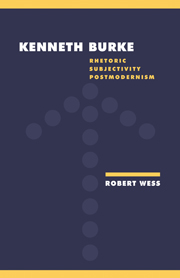Book contents
- Frontmatter
- Contents
- Preface
- Acknowledgments
- List of abbreviations
- 1 Ideology as rhetoric
- 2 Counter-Statement: aesthetic humanism
- 3 Permanence and Change: a biological subject of history
- 4 Attitudes toward History: the agon of history
- 5 The Philosophy of Literary Form: history without origin or telos
- 6 A Grammar of Motives: the rhetorical constitution of the subject
- 7 A Rhetoric of Motives: ideological and utopian rhetoric
- 8 The Rhetoric of Religion: history in eclipse
- Index
2 - Counter-Statement: aesthetic humanism
Published online by Cambridge University Press: 21 May 2010
- Frontmatter
- Contents
- Preface
- Acknowledgments
- List of abbreviations
- 1 Ideology as rhetoric
- 2 Counter-Statement: aesthetic humanism
- 3 Permanence and Change: a biological subject of history
- 4 Attitudes toward History: the agon of history
- 5 The Philosophy of Literary Form: history without origin or telos
- 6 A Grammar of Motives: the rhetorical constitution of the subject
- 7 A Rhetoric of Motives: ideological and utopian rhetoric
- 8 The Rhetoric of Religion: history in eclipse
- Index
Summary
As for our set-piece, the “Lexicon Rhetoricæ”… [It] would look upon literature as the thing added – the little white houses in a valley that was once a wilderness.
Burke, CSA college dropout, Burke quit Columbia University in 1918 and settled in Greenwich Village to become a writer (SCBC 5). He took his inspiration from Flaubert, as he wrote in a letter that year a few months before his twenty-first birthday. “I shall get a room,” he writes,
and begin my existence as a Flaubert. Flaubert is to be my Talmud, my Homer, my beacon… Already I have begun going through his letters… I am going to nourish myself with Madame Bovary, learn how every character is brought in, tabulate every incident. I am sure there is a triumph in every sentence of Flaubert, and I am going to find it.
(SCBC 56)Broom, Secession, The Little Review, S4N, Manuscripts – these experimental “little magazines,” usually short-lived, are among the places where Burke first published stories later collected in WO, which appeared in 1924. In 1916, he had published a poem, “Adam's Song, and Mine,” in Others: a Magazine of the New Verse, which included William Carlos Williams among its associate editors and Marianne Moore, Ezra Pound, Wallace Stevens, and T. S. Eliot among the poets it featured during its four years of existence, from 1915 to 1919.
During the 1920s, while his friends Malcolm Cowley and Matthew Josephson expatriated to Paris, Burke became closely associated with The Dial, generally considered the decade's “most important aesthetic journal.”
- Type
- Chapter
- Information
- Kenneth BurkeRhetoric, Subjectivity, Postmodernism, pp. 39 - 54Publisher: Cambridge University PressPrint publication year: 1996



